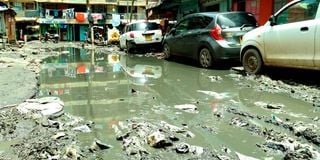For things to get better, all have to chip in

A flooded road with sewer at Pipeline Estate, Nairobi on March 25, 2023. Besides the high cost of living, housing is inadequate and access to clean water and sanitation facilities is a luxury only a few can afford.
The high cost of basic commodities has led to poor conditions of living, with millions of people around the country struggling to make ends meet.
Besides the high cost of living, housing is inadequate and access to clean water and sanitation facilities is a luxury only a few can afford.
The country’s economy is in shambles, and the prospects of a better future seem bleak for many.
For the majority of Kenyans, especially those living in urban areas, rent, food and healthcare expenses take up the lion’s share of their income, leaving them with little or no resources for other necessities such as clothing and education.
In the slums and other informal settlements, the situation is even worse, with families crammed into tiny, dilapidated structures with no access to basic amenities like clean water, sanitation and electricity.
The impact of poor conditions of living on individuals and the economy is devastating.
People are unable to access basic services, leading to low productivity, high healthcare costs and reduced quality of life.
The upshot is that the vicious cycle of poverty is heightened, leading to a spike in social unrest, crime and insecurity.
Luckily, the government, international organisations and other stakeholders have been playing their part to address these challenges.
For instance, the government’s affordable housing initiative seeks to provide decent, affordable shelter to low-income families.
International organisations such as UNICEF and the World Bank have funded major programmes geared towards improving access to clean water and sanitation facilities.
Poor living conditions
However, despite these commendable interventions, we must note that addressing the poor conditions of living in Kenya requires a multi-pronged approach.
It will take the collective effort of all stakeholders to make things better.
Creating more job opportunities, promoting entrepreneurship and improving access to education and healthcare services are some of the steps that can be taken to break the cycle of poverty.
Taking these steps would ensure a brighter future for all.
Improving the quality of life for all citizens is a pressing issue that demands urgent attention.
The prevailing low quality of life affects millions of people and has far-reaching implications for the country’s social and economic well-being.
By working together, we can create a more equitable and prosperous society for all Kenyans.
Jecktone Odhiambo, Trans Nzoia



